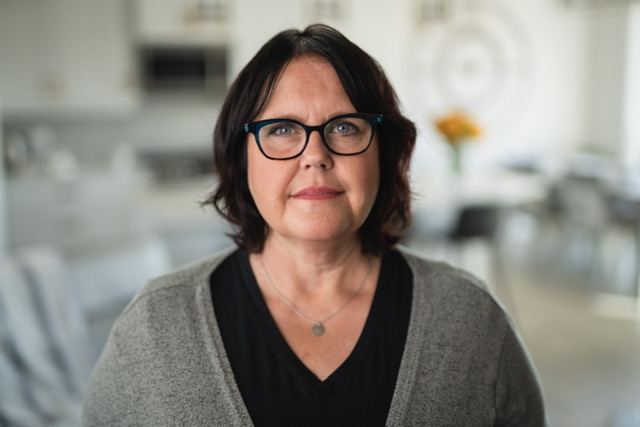
Joanne’s Story: A Race Against Time
Joanne, a vibrant 54-year-old, has always had an extremely fulfilling life. 30+ years at her job, two sons in university, a loving spouse, and a passion for golf, pickleball, and lakeside escapes. But a shadow loomed, cast by a history she couldn’t ignore: her mother’s battle with ovarian cancer.
“Back in 2002, they just didn’t have the resources that we do now,” Joanne recalls, her voice tinged with a familiar sadness speaking about her mother’s passing. “We were in the dark.”
Determined to be proactive, Joanne requested genetic testing back in 2008. The hope was to understand her risk, and to be equipped with the knowledge to make choices that might impact her future. But the answer was a crushing blow: denied. “They wouldn’t test me,” she says, the frustration still palpable.
Years passed. Life went on. Then, in 2017, a sharp pain jolted Joanne’s world while she was playing softball. “Shooting pain down my left leg,” she remembers. She knew this pain wasn’t normal and an ultrasound led to a terrifying discovery: a large mass on her left ovary.
The whirlwind that followed was a blur of doctor’s appointments, CT scans, and surgery. Both ovaries, uterus, cervix, and 19 lymph nodes were removed. Six rounds of chemotherapy followed.
“Even with my family history, it still wasn’t clear if it was genetic,” Joanne says, highlighting the persistent uncertainty.
Joanne had initiated the genetic testing with her doctor, but her mother’s oncologist always insisted it was not a genetic disease. Around this time prevention was very much a hot news topic, and it made Joanne think about how this may have been prevented with genetic screening. At the time of her getting denied genetic testing, the geneticist said, “you must be very angry with us right now” given that Joanne was originally denied testing.
That was an understatement.
Her husband became her rock, attending every treatment and spending long days at the cancer center. Friends rallied, offering support and comfort. Joanne found solace in a support group, a “safe space” where she connected with other women facing similar battles.
But Joanne’s story isn’t just about survival; it’s about advocacy. She shares the story of a friend’s sister, whose abdominal pain was dismissed, leading to a late-stage diagnosis and a tragic outcome. “Often patients are not heard or taken seriously,” Joanne emphasizes, her voice filled with urgency.
Joanne’s message is clear: “Anyone can really have hope.” She points to Ovarian Cancer Canada (OCC) and local support groups as vital resources. She urges everyone to participate in the National Walk of Hope on September 7th, 2025, the 20th anniversary of the event.
But her plea extends beyond hope and support. “Treatment standards are about the same as they were 20 years ago,” she says, frustration creeping back into her voice. “We need more tailored approaches for those that maybe don’t respond to treatments.”
Joanne’s story is a stark reminder of the importance of genetic testing and early diagnosis. It’s a call to action for elected representatives and health system decision-makers to prioritize access to these life-saving tools.
“I’m grateful I had the education and knowledge about the disease,” Joanne concludes. But knowledge alone isn’t enough. We need to ensure that everyone has the opportunity to understand their risk and take control of their health.
There are far too many similar stories of people in Canada waiting to be a priority. Cancer Action Now is working to highlight the experiences of people in Canada living with cancer and trying to access timely, high-quality cancer care, and calling on policy makers to make cancer care a priority.
Join the effort by signing up here. Stay connected by following us on Twitter, Instagram and Facebook.
There are far too many similar stories as people in Canada are waiting to be a priority. Cancer Action Now is working to bring forward challenges experiences by people in Canada living with cancer in accessing timely, high-quality cancer care, and calling on policy makers to make cancer care a priority.
Join the effort by signing up here. Stay connected by following us on Twitter, Instagram and Facebook.